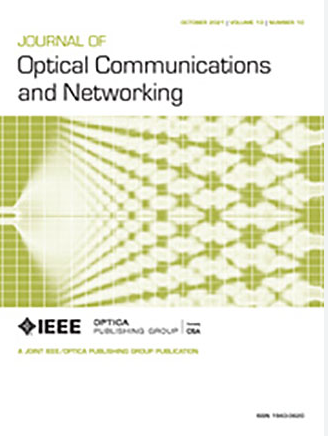基于优先级权重的计算和频谱资源调度,适用于 EON 支持的计算先行网络中的依赖性任务
IF 4.3
2区 计算机科学
Q1 COMPUTER SCIENCE, HARDWARE & ARCHITECTURE
引用次数: 0
摘要
由弹性光网络(EON)支持的计算第一网络(CFN)作为一种创新的信息基础设施被提出,终端用户可以按需访问计算资源。然而,由于链路容量有限,即使计算资源充足,网络容量瓶颈也可能导致任务卸载失败。本文提出了一种具有成本效益的计算和频谱资源调度方案来解决上述问题。其目标是通过最小化完成延迟和由非绿色能源供电的计算节点的能耗(即非绿色能耗)来确定依赖任务的卸载决策。本文提出了一种基于优先权的计算和频谱资源调度(PW-CSRS)算法,该算法可以对子任务的执行顺序进行排序,并优化计算节点选择和频谱分配。将 PW-CSRS 与 52 节点和 33 节点系统中的三个基准进行了比较,仿真结果表明,PW-CSRS 能有效提高接受率并降低非绿色能耗。本文章由计算机程序翻译,如有差异,请以英文原文为准。
Priority-weight-based computing and spectrum resource scheduling for dependent tasks in EON-supported computing first networks
The computing first network (CFN) supported by the elastic optical network (EON) is proposed as an innovative information infrastructure, where end users can access computing resources on demand. However, since the link capacity is limited, the network capacity bottleneck may cause task offloading failures even with sufficient computing resources. This paper proposes a cost-efficient computing and spectrum resource scheduling scheme to solve the above problem. The goal is to determine offloading decisions for dependent tasks by minimizing the completion delay and the energy consumption on computing nodes powered by non-green energy (i.e., non-green energy consumption). A priority-weight-based computing and spectrum resource scheduling (PW-CSRS) algorithm is proposed, which can sort the execution order of sub-tasks and optimize computing node selection and spectrum allocation. PW-CSRS is compared with three benchmarks in the 52-node and 33-node systems, and simulation results show that PW-CSRS can effectively improve the acceptance ratio and reduce non-green energy consumption.
求助全文
通过发布文献求助,成功后即可免费获取论文全文。
去求助
来源期刊
CiteScore
9.40
自引率
16.00%
发文量
104
审稿时长
4 months
期刊介绍:
The scope of the Journal includes advances in the state-of-the-art of optical networking science, technology, and engineering. Both theoretical contributions (including new techniques, concepts, analyses, and economic studies) and practical contributions (including optical networking experiments, prototypes, and new applications) are encouraged. Subareas of interest include the architecture and design of optical networks, optical network survivability and security, software-defined optical networking, elastic optical networks, data and control plane advances, network management related innovation, and optical access networks. Enabling technologies and their applications are suitable topics only if the results are shown to directly impact optical networking beyond simple point-to-point networks.

 求助内容:
求助内容: 应助结果提醒方式:
应助结果提醒方式:


